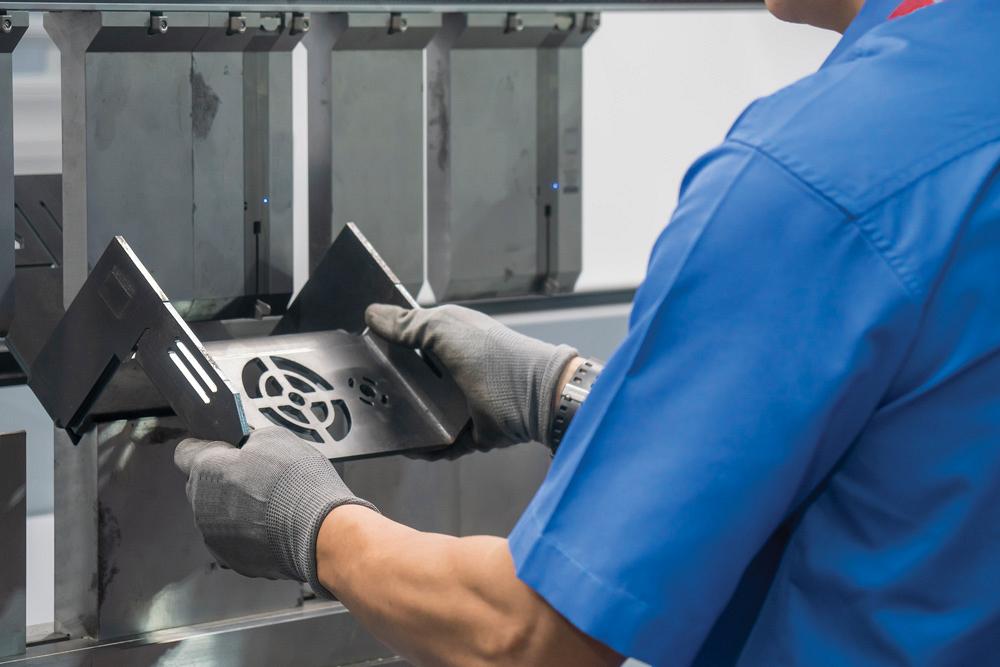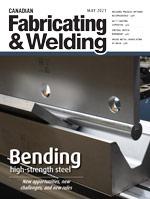Editor
- FMA
- The Fabricator
- FABTECH
- Canadian Metalworking
Press brake training certification is in (virtual) session
FMA’s press brake certificate class finds a receptive audience online
- By Rob Colman
- Updated January 17, 2023
- May 20, 2021
- Article
- Fabricating
The sophistication of today’s newer press brake technology often makes it possible to get less-skilled employees up and running on the machines rather quickly. However, ultimately, it’s a great value to a business to further develop those team members so that when an issue arises with a part, they have the knowledge to respond to it and solve the issue without assistance.
The Fabricators & Manufacturers Association (FMA) Precision Press Brake Certificate Course is one way that many companies across North America have managed to increase this press brake knowledge among their staff. The course usually is an intensive, two-day seminar to teach operators, engineers, and associated personnel the theory and math fundamentals behind the machine to uncover the secrets of working with press brakes. It teaches the principles behind quality sheet metal bending through interactive instruction and sample work problems throughout the course.
As they say, knowledge is power. In 2018, for instance, Lower Sackville, N.S.-based SureShot Solutions found that for the 10 weeks after the training took place, it’s good part rate increased from 90 per cent to around 97 per cent.
Press Brake Training Transitions Online
Like so many other programs, the pandemic has affected FMA’s ability to deliver the course in person. However, like so many other organizations, it has managed to adapt and find the right approach to presenting the course online.
“We ran a pilot last fall, working with course moderator Steve Benson to come up with the right alterations to make it tenable for attendees,” said Ann Schneider, senior education and member services specialist at FMA.
The in-person course is designed to be taken over two days, involving 12 to 14 hours of interaction—lectures, demonstrations, and discussions.
“We knew that that would be too much to manage in an online forum,” said Schneider. “Instead, the course is now designed to stretch over three days, with each class session being just three hours long. That is really pushing the limits of what anyone can retain in one day through an online learning program.”
Supplementing these live, interactive sessions are video tutorials that those taking the certificate can review in their own time. In this way, online attendees don’t miss any key information available to those who have taken the course in person.
Adapting On-the-go
The pilot program that FMA ran last November was useful in getting feedback about how the program will work in the future.
“The next time we offer the program, we have adjusted the program slightly to give attendees more time for questions and discussion,” said Schneider. “Adapting to feedback from attendees is a key part to making anything like this work.”
Taylor Rachel, a new press brake operator at Delta, B.C.-based Brenco Industries, was one of the attendees of the pilot program in November.
“I had no experience with press brakes before being hired,” he said. “Working with a CNC-controlled press brake means that the machine does a lot on its own to make a good part, but the course definitely helped me understand why it does what it does. A lot of what I heard in the course went over my head because I’m so new, but it definitely helped me with some of the math aspect of the work I do. Also, having the recordings to go back to and rewatch is really helpful.”
Rachel believes the training will be even more beneficial as he gets the opportunity to work with other equipment in the Brenco facility.
“I work on a fairly small machine right now,” he said. “Some of the training will come in handy using our larger machines, where the team has to calculate bend lines. Having taken the course, I have that information to pull from.”
The main takeaway that Schneider had from the pilot was that there remains a hunger for instruction in press brake fundamentals.
“Last year, we ran in-person classes in February, and the online pilot. We did little promotion for the pilot and still had more attendees than the in-person option,” she said.
The next online class will take place March 22-24. As much as Schneider looks forward to being able to see people at live classes again soon, she also recognizes that providing the option of online learning could be a benefit for shop owners across North America.
“Our pilot session included attendees from coast to coast in the U.S., as well as a few people in Canada,” she said. “The virtual format made this possible. Now we can reach press brake operators in remote locations who might struggle to find the time to travel to attend an event. While we are focusing a great deal on getting back to in-person events, online classes will continue as well. It’s good to have these tools to offer benefits to a broader selection of fabricators.”
For more on the certificate program visit https://www.fmamfg.org/training/certificates/precision-press-brake.
Editor Robert Colman can be reached at rcolman@canadianfabweld.com.
About the Author

Rob Colman
1154 Warden Avenue
Toronto, M1R 0A1 Canada
905-235-0471
Robert Colman has worked as a writer and editor for more than 25 years, covering the needs of a variety of trades. He has been dedicated to the metalworking industry for the past 13 years, serving as editor for Metalworking Production & Purchasing (MP&P) and, since January 2016, the editor of Canadian Fabricating & Welding. He graduated with a B.A. degree from McGill University and a Master’s degree from UBC.
subscribe now


Keep up to date with the latest news, events, and technology for all things metal from our pair of monthly magazines written specifically for Canadian manufacturers!
Start Your Free Subscription- Industry Events
Automate 2024
- May 6 - 9, 2024
- Chicago, IL
ANCA Open House
- May 7 - 8, 2024
- Wixom, MI
17th annual Joint Open House
- May 8 - 9, 2024
- Oakville and Mississauga, ON Canada
MME Saskatoon
- May 28, 2024
- Saskatoon, SK Canada
CME's Health & Safety Symposium for Manufacturers
- May 29, 2024
- Mississauga, ON Canada





















